How to become a survival trainer in Germany? These paths will lead you to your dream job (plus salary and training).
Are you an outdoor enthusiast and want to use your skills to earn money? Learn how to become a survival instructor in Germany, including training details.
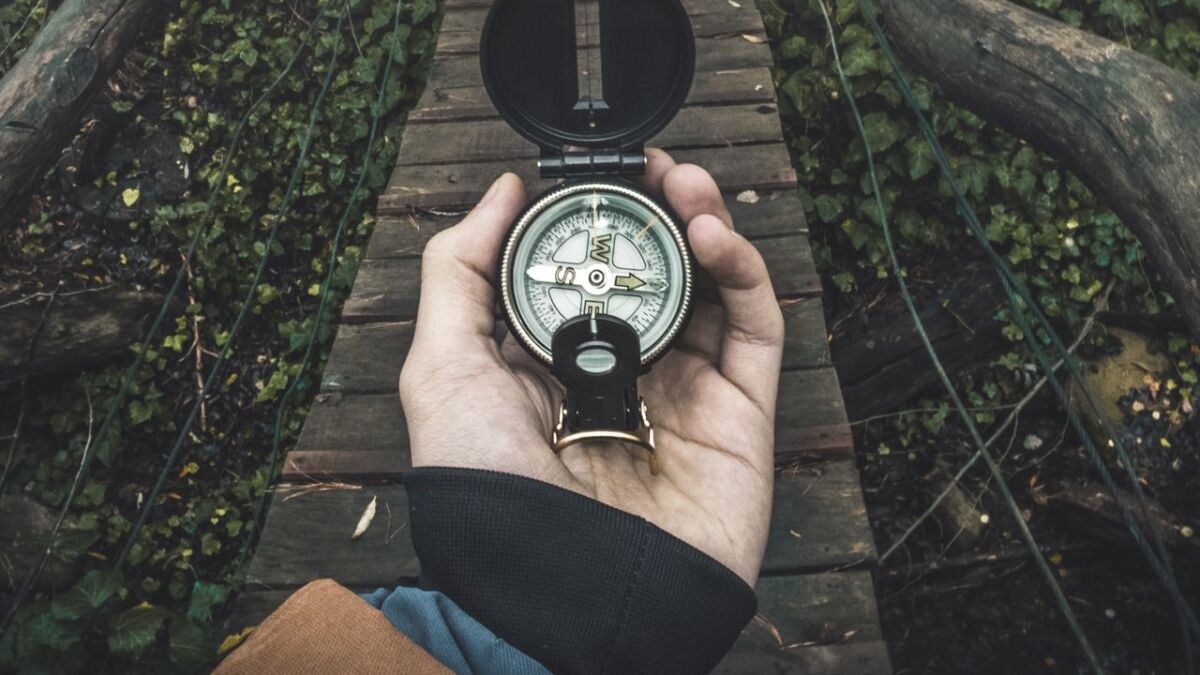

From Martin Gebhardt. Check out my “About me” page.
👉 The key facts from this guide
- Do you want to become a survival trainer? You need extensive knowledge of survival strategies, edible plants, and navigation in the forest.
- As a survival trainer, you teach not only how to survive in tough times, but also how to plan and lead teams to solve problems together.
- There are various training options for aspiring survival trainers, including wilderness schools and survival trainings that teach all necessary skills.
- The certificates of survival schools are not recognized by the state, they are issued by the respective schools themselves.
- As a survival trainer, you can work in various fields, including guiding groups through the wilderness, conducting survival camps, and working at wilderness schools.
- The income of a survival trainer can vary greatly, depending on the number of courses he gives and whether he is employed or self-employed.
Survival trainers have made it their mission to teach people skills for surviving in the wilderness, far away from civilization.
The work as a survival trainer requires extensive knowledge of survival strategies, knowledge of edible plants, and proper orientation in the forest.
But how does one actually become a survival trainer in Germany, and what training is necessary for it?
What is a survival trainer?
👉 A survival trainer, or survival expert, is a skilled and experienced professional who specializes in teaching people the necessary skills to survive in nature and the wilderness.
How often have we imagined being exposed to the wilderness with only our hands and a sharp instinct, and successfully surviving?
A survival trainer can help make this dream come true.
Imagine learning wilderness skills that give you the confidence to be successful in any situation and experience nature in a whole new way.
A survival trainer not only teaches how to survive in tough times, but also how to make plans and lead teams to solve problems together.
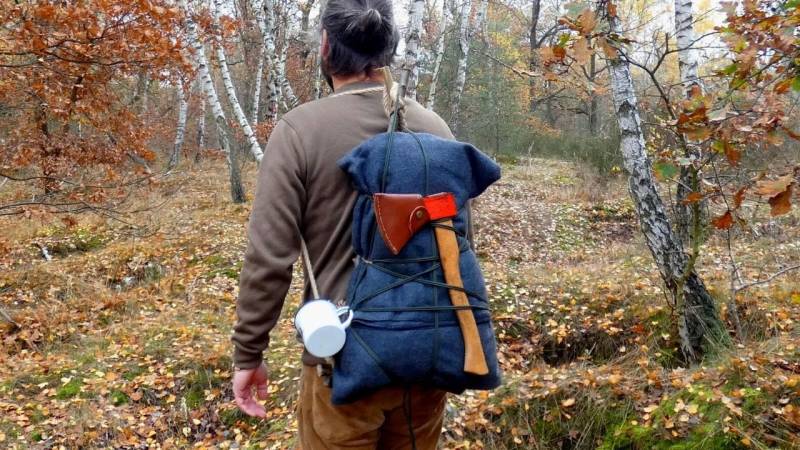
A good preparation and organization are crucial for successfully coping with adversities in nature. With a survival trainer, other people will gradually learn how to overcome obstacles and make progress in challenging environments.
What is the most important thing you want to teach your students?
There are quite a few misconceptions about the basic needs for survival. On our website, we have a survival quiz with 12 questions about the most common myths in survival. On average, participants score just under 6 correct answers, so not even half. My goal is for someone to have 10 to 12 correct answers after taking a survival course with us.
– Benjamin Arlet - Since 2015 Survival Trainer & Founder of SurviCamp
Individuals and groups alike will benefit from the skills and knowledge of a survival trainer. Whether it's at team building events or individual adventures, a survival trainer will put the skills of the people to the test and enable them to go beyond their limits.
People will recognize how powerful their personal resources are when they, under the guidance of an expert, master the challenges of the wilderness.
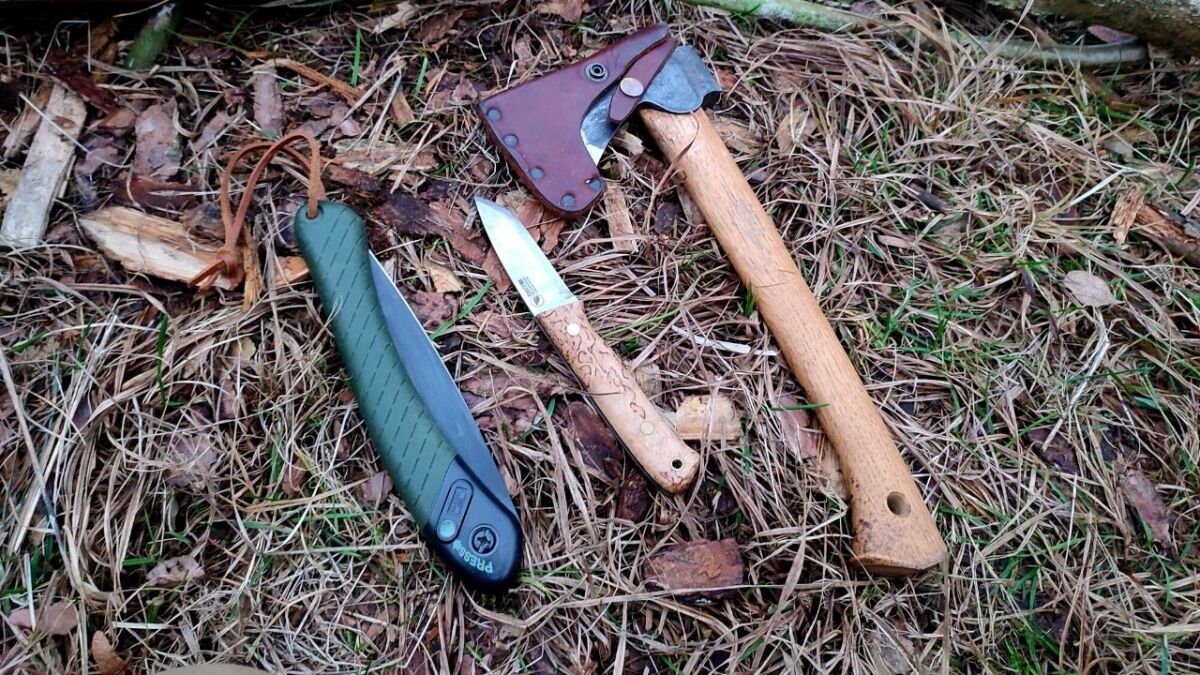
Learning wilderness skills and surviving in nature is a rewarding and enriching experience. It paves the way for personal growth and sharpens awareness of the importance of environmental protection and sustainable living.
You, as a survival trainer, could be the perfect companion for this tension-filled, life-changing journey.
What was the most challenging situation you have ever experienced in the wilderness and how did you overcome it?
When we were on a trekking tour in Lapland, a member of our group fell ill. Another member had brought poor equipment and soon had a wet sleeping bag and wet clothes, putting themselves at risk of getting sick. So we had to improvise quite a bit, redistribute luggage, etc. Two dropouts out of only 5 people would have been problematic, because we would have only been reachable by foot or helicopter from the outside. In the end, however, everyone reached the goal because the group worked well together.
And in our courses, the most challenging situation probably had nothing to do with wilderness: Once, on the night before a survival camp, our car was broken into and damaged, so we couldn't bring ourselves and the equipment to the course location. However, since we always plan enough time for incidents, we were able to start the camp with just an hour's delay. This is just part of being a professional survival trainer 😉
– Benjamin Arlet - Since 2015 Survival Trainer & Founder of SurviCamp
What skills and knowledge does a survival trainer need?
A survival trainer must possess a wide range of skills and knowledge.
The following is important:
- Good fitness
- Many skills for survival in the wilderness
- Knowledge of edible plants
- Correct orientation in the forest
- Skills in self-defense
- Applying first aid
- Mental and emotional abilities
There are still a few more, and I will go into each one in detail below.
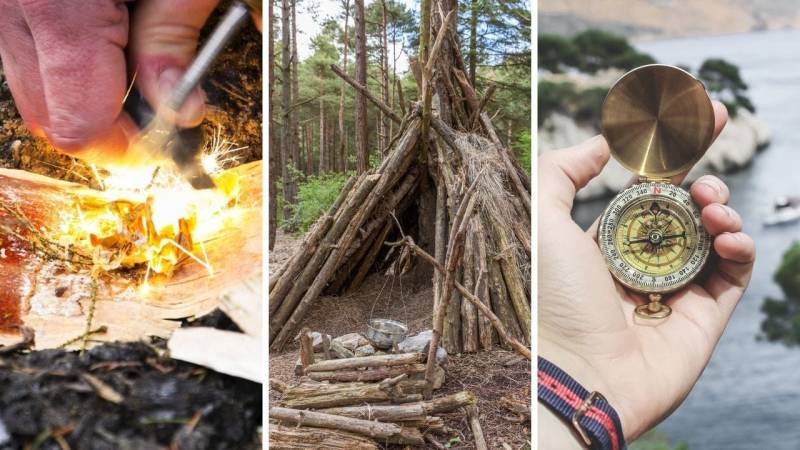
What training opportunities are available for aspiring survival trainers?
There are numerous ways to obtain training as a survival instructor. Many wilderness schools and survival training programs offer courses that teach all the necessary skills for surviving in the wilderness.
It is also possible to take more specific courses, such as in the areas of Bushcraft, Wild Plant Knowledge, or Orientation.
Additionally, there are certified trainer trainings and modules to gain a broader knowledge and understanding in the field of survival methodology and psychology.
However, note that these certified trainer trainings are not official government institutions.
Below, I will introduce you in detail to 5 wilderness schools that offer such training to become a trainer.
What was the decisive moment when you decided to become a survival instructor?
Participation in a survival camp, of course 😉 That's when I realized once again how much fun I have with the topic that accompanied me through my childhood and youth. At that time, I also knew from my other job that I enjoy standing in front of people as a trainer. Combining both was an enticing combination for me.
– Benjamin Arlet - Since 2015 Survival Trainer & Founder of SurviCamp
Are the certificates and participation certificates recognized by the state?
Unfortunately, the certificates of survival schools are not officially recognized, as they are issued by the respective schools themselves and there is no uniform curriculum agreed upon by all programs.
Survival School A might teach something different from Survival School B. Therefore, before starting your training, carefully examine and compare the curriculum.
The Basic Skills for Aspiring Survival Trainers
What wilderness skills must aspire to survival trainers master?
A survival trainer must master a variety of wilderness skills to effectively teach and survive in emergencies.
To work successfully as a trained survival instructor, you should master basic skills such as making fire, building shelters, finding food, and purifying water.
A survival trainer also deals with orientation and navigation, with and without a compass and map. Self-defense techniques are also useful.
How did your first survival experience influence your decision to become a survival trainer?
I realized that I function flawlessly in such situations and enjoy improvising solutions.
– Benjamin Arlet - Since 2015 Survival Trainer & Founder of SurviCamp
However, keep in mind that some training programs prioritize different skills. Occasionally, the focus is on wilderness skills, while other programs prioritize communication with groups.
So that you get an overview, I have listed essential skills for you here.
1. Basic Survival Skills
With these skills, you will learn how to orient yourself in the wilderness, cover your basic needs with simple or improved methods, and efficiently navigate survival situations.
- Starting a fire: Understanding how to start and maintain a fire under different conditions.
- Finding and purifying water: Knowledge of various methods for obtaining and purifying water.
- Locating food: Skills in identifying edible plants, wild plants, insects, and wildlife.
- First aid: Basic knowledge of first aid and wilderness medicine.

Reading tip: Making fire without a lighter/matches and 10 steps for a perfect fire.
2. Orientation and Navigation
- Map reading and compass use: Ability to read topographic maps and effectively use a compass.
- Natural navigation: Use of natural clues and patterns for orientation.
Reading tip: how to navigate without a map and compass, as well as an introduction to navigation with a map and compass.
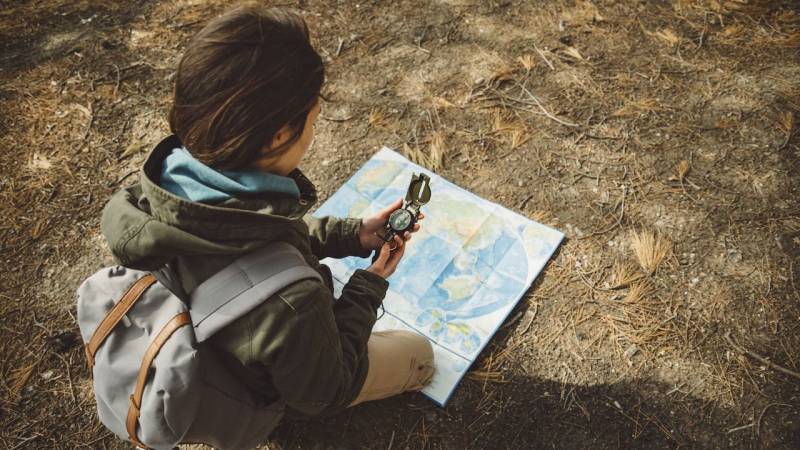
3. Shelter Building and Protection
- Shelters: Knowledge about different types of shelters and how to build them.
- Location: Understanding of selecting the best location for a shelter.
Reading tip: Here's how to build a shelter, and here you can find information on choosing the right location.
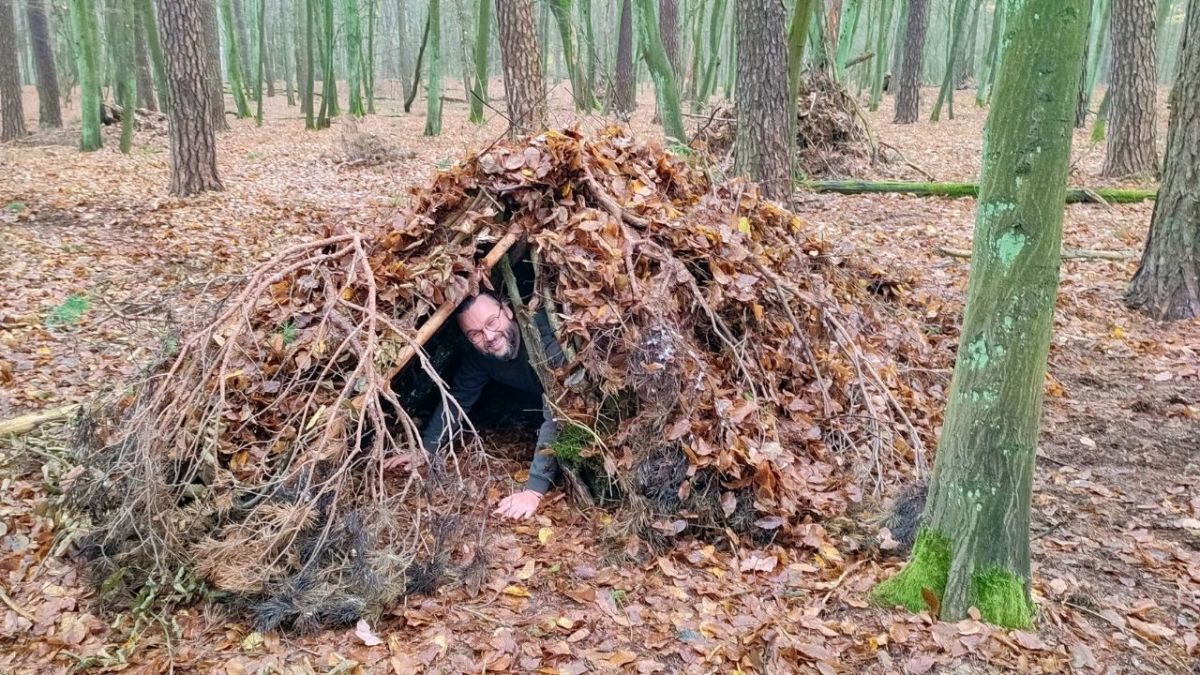
4. Wilderness Craft
- Tool making: Ability to make simple tools and weapons from natural materials.
- Knot knowledge: Knowledge of different knots and their applications.
Reading tip: 6 important knots for bushcraft and survival
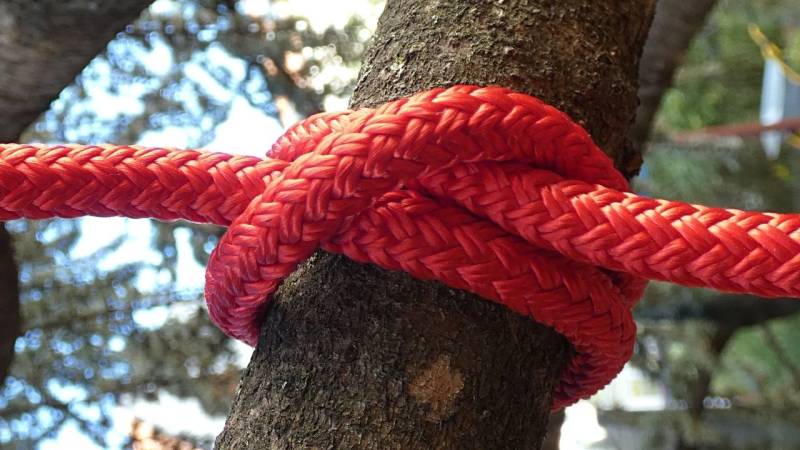
5. Wilderness Knowledge
- Ecosystems: Knowledge about different ecosystems and their specific challenges.
- Animals: Understanding of the behavior of wild animals and how to safely interact with them.
Reading tip: "Starting with tracking and interpreting animal tracks" and find here the ultimate guide "Animal tracks in the snow (by certified tracker)".
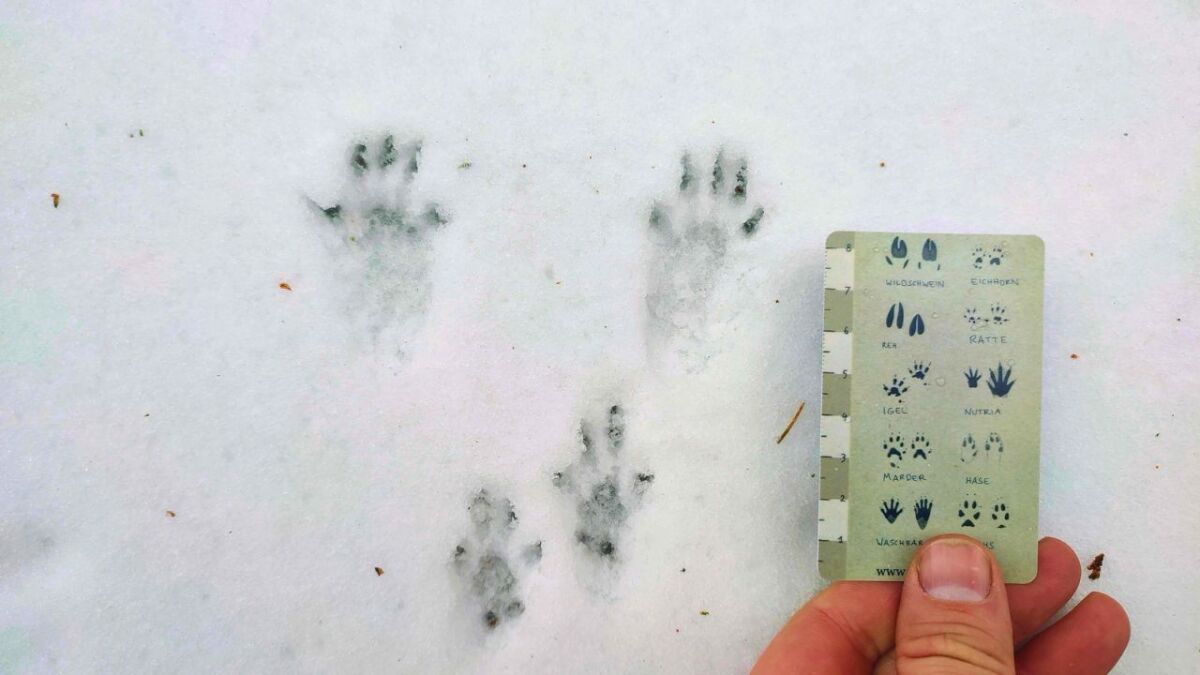
6. Social and Pedagogical Skills
- Group leadership: Ability to lead groups, effectively guide and motivate a group.
- Teaching skills: Ability and knowledge to effectively convey information.
- Conflict resolution: Ability to resolve conflicts within a group and create a positive learning environment.
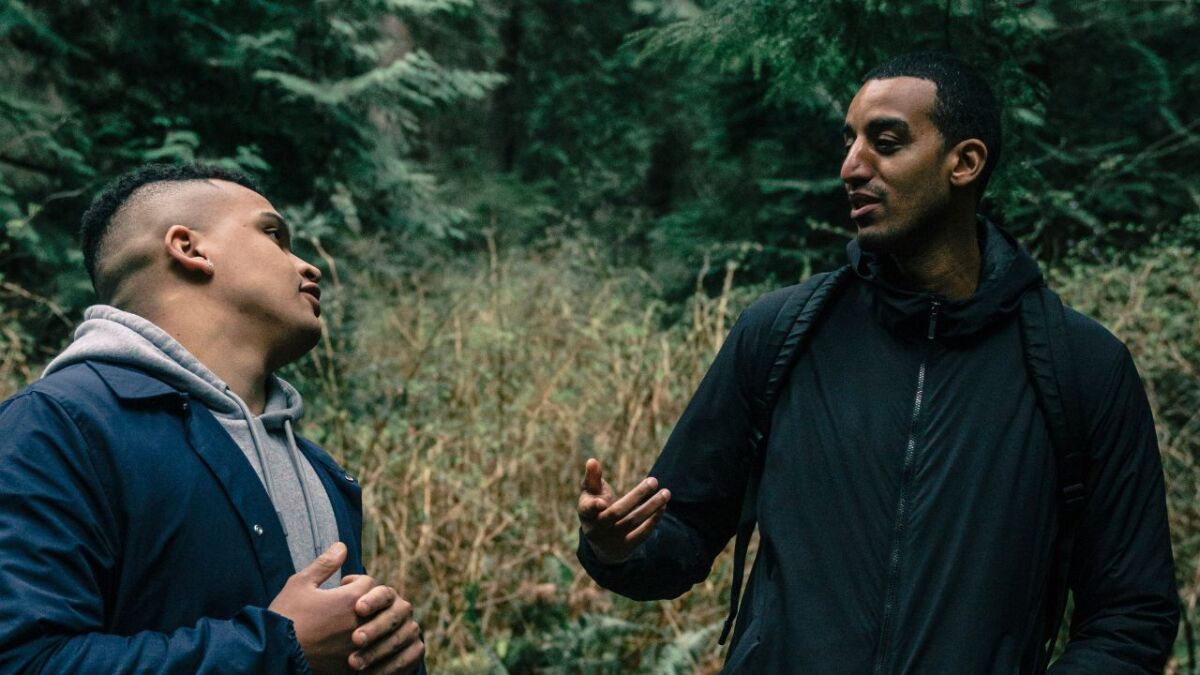
7. Mental and Emotional Abilities
- Panic Management: Ability to remain calm and make effective decisions in stressful or dangerous situations.
- Mental Strength: Ability to overcome challenges and difficulties and focus on survival.
- Adaptability and Flexibility: Ability to adapt to changing conditions or unexpected challenges.
- Resilience: Ability to recover from setbacks and keep going despite difficulties.

8. Physical Abilities
- Physical Fitness: Good overall health and fitness to cope with the physical demands of surviving in the wilderness.
- Mental Fitness: Ability to stay mentally alert and focused even under difficult conditions.
Read also
Body training in the forest: Effective workout and sports (Forest Fitness). – Discover the power of Forest Fitness! Learn how to use the forest as your personal gym, strengthen your muscles, and reduce stress at the same time.
9. Perception and Consciousness
- Environmental awareness: The ability to perceive the environment accurately and to detect changes or hazards early.
- Nature connection: A deep understanding and appreciation for nature that helps to better understand and utilize the environment.
What is the most important skill that a prospective survival trainer should learn?
I think there are two things. The first is to assess priorities correctly - so always knowing what is most important right now. This is essential for both real emergencies and for training - in an emergency, otherwise I would waste scarce resources, in training, otherwise I would waste my paying participants' time.
In addition, a certain ability to endure suffering is required - I like to say that you have to learn how to switch on the survival switch. Only then can you stuff your clothes with leaves to be better insulated against the cold of the night - it scratches, and you get ticks for free. In the short term, however, you increase your chances of survival.
Another example: Once I stood with a group at a very deep ditch about 3 meters wide that we wanted to cross. While the group had discussed at length whether one could perhaps lay a log across the ditch and then walk across it, because nobody wants to get dirty, I had packed my backpack waterproof in a few minutes and swam across the ditch to the other side in my underwear. You have to get rid of such civilization thoughts as "You get dirty in such situations" and be able to engage in a survival situation with changed rules.
– Benjamin Arlet - Since 2015 Survival Trainer & Founder of SurviCamp
What experiences are useful for a survival trainer training in Germany?
To start training as a survival instructor, it is advisable to have already gained some experience in nature. This can be achieved, for example, through camping trips, hiking or other outdoor activities.
Ideally, you have already participated in a survival training or similar seminars at a wilderness school.
What are the requirements for most training courses to become a survival trainer in Germany?
In most survival trainer courses, certain requirements must usually be met to participate.
Foremost, you should be at least 18 years old, as the training involves both physical and mental challenges that require a certain level of maturity and responsibility.
Physical fitness and resilience are also important, as training often involves intense physical activities in the great outdoors. Therefore, it is also important that you know how to swim, as water activities are often part of the training.
What was the biggest challenge you had to face on your way to becoming a survival trainer?
Some activities are really dangerous, especially anything related to climbing and heights. But even with handling bows and crossbows, a lot can go wrong. It was a great challenge for me to become so confident in dangerous activities that I can confidently teach them and be sure that nothing will happen.
– Benjamin Arlet - Since 2015 Survival Trainer & Founder of SurviCamp
Furthermore, mental health and mental resilience are of great importance. Training can be stressful and often requires one to remain calm and focused on difficult or unpredictable situations.
Finally, an open and positive learning attitude is crucial. The ability to learn new skills, accept feedback, and constantly improve oneself is a key to success in this education.
In summary, there are the following requirements:
- Minimum age: 18 years
- Physical fitness and endurance
- Mental health and resilience
- Ability to swim
- Open and positive attitude towards learning
- Willingness to invest time and energy in training
In Germany, there are no specific requirements that you must meet to work as a survival trainer. However, it is advantageous if you already have experience in the wilderness and have knowledge of first aid.
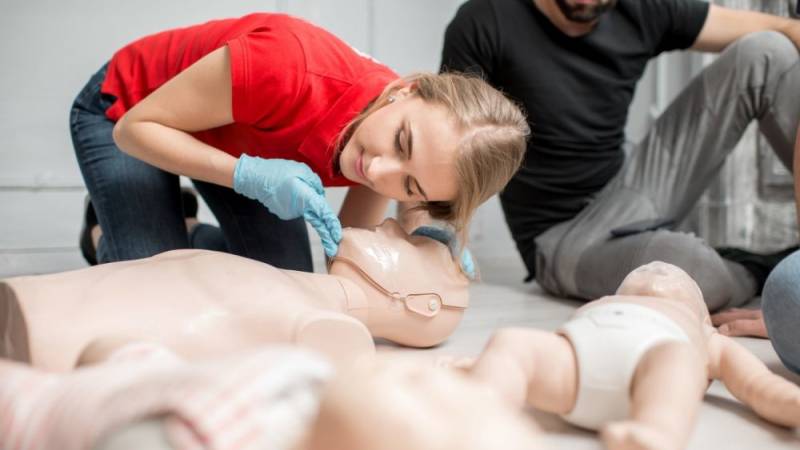
An education in outdoor sports such as mountaineering or canoeing can also be helpful.
Furthermore, some providers may have different training conditions and admission requirements.
Sometimes it is expected of you to have completed an outdoor guide training, trainer training, or a similar qualification in a related outdoor field such as adventure education, wilderness education, or outdoor training.
Sometimes completed survival trainings that lasted for several days are also required as an alternative.
What kind of training or education would you recommend to someone who wants to become a survival trainer?
Definitely a training that covers both survival skills and the craft of being a trainer. Because if I know a lot but have no plan for teaching it to others, how to read a group, how to create an interesting training program and how to market myself, then it’s just a hobby, not a profession. That was the reasoning behind our trainer education at SurviCamp. The percentage of those who work in this industry after training with us is about 70%.
I also think it's important to consciously broaden your skillset beyond just survival. Because even though the topic is getting bigger, it is still just a niche and it is very difficult to make a living solely from survival training.
– Benjamin Arlet - Since 2015 Survival Trainer & Founder of SurviCamp
What additional training opportunities are available for aspiring survival trainers?
There are numerous educational opportunities to advance in the field of survival training, such as specific courses in survival psychology or surviving in specific climate zones.
Even seminars, webinars or online distance learning courses (such as Wildimpuls) allow you to further educate yourself in various areas such as nature crafts, food foraging, outdoor techniques and tactics, or self-defense.
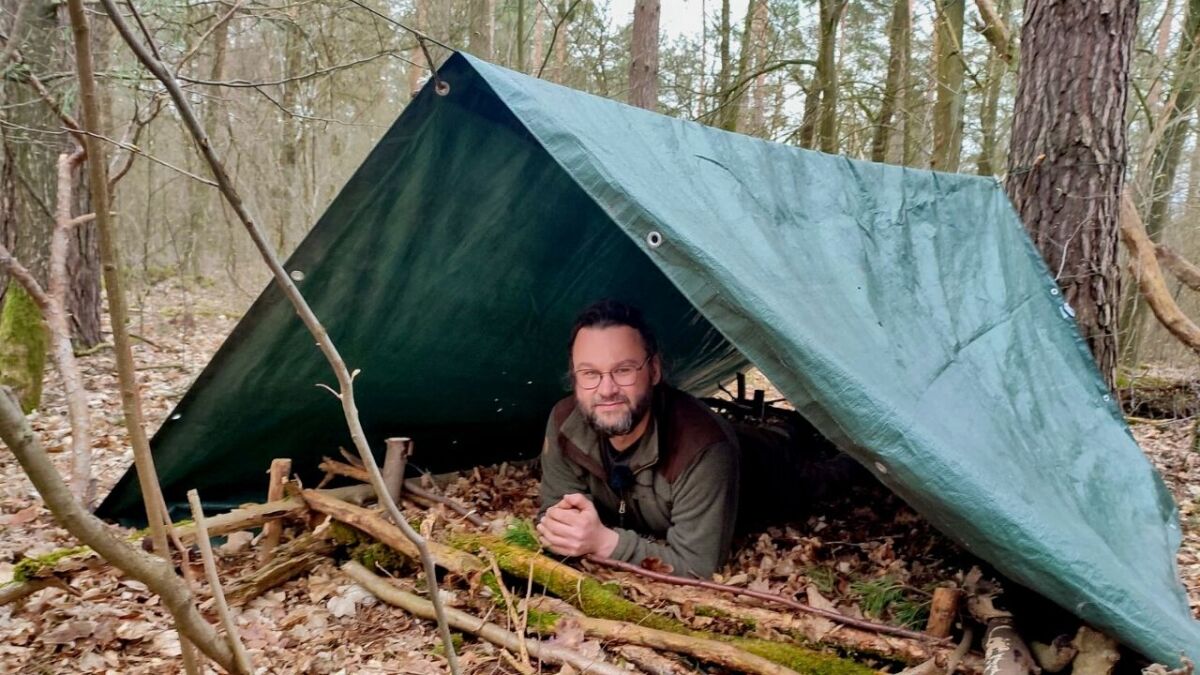
How do you sign up for a survival coach training?
Are documents required for registration for the trainer training?
Depending on the trainer's education, different documents such as applicant information, resume, certificate, and personal motivation letter are necessary. Information on this and the application form can be found in the respective trainer education.
What equipment is recommended for a survival trainer training?
To conduct a successful trainer training, basic survival equipment such as sleeping bag/tent/tarp, fire starter, knife, outdoor clothing, and other equipment are required.
Some training programs also provide equipment, or it is included in the course fee.
Reading tip: Here you can find my complete equipment that I am currently using.
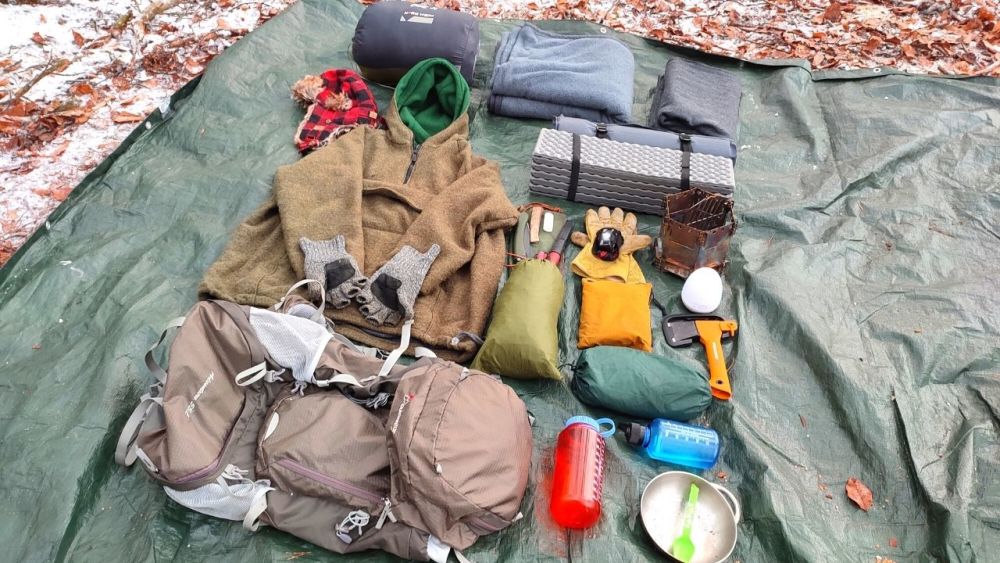
How long does a survival trainer training usually last?
The duration of a trainer education can vary depending on the provider and content. On average, one can expect a training period of several weeks to several months and a year.
How do you deal with the physical and mental challenges that come with survival training?
Here, a certain mindset helps – taking things as they come, evaluating them objectively, and deriving decisions from them. Of course, I can be terribly upset that the sole of my shoe is coming off, and wonder why this had to happen to me and right now – of course, at the most inconvenient time. But that won't get me anywhere. One has to detach oneself from being able to control everything. In addition, the thought that everything will look completely different in two hours, tomorrow, or next week helps me.
– Benjamin Arlet - Since 2015 Survival Trainer & Founder of SurviCamp
How do you work after completing training as a survival trainer?
Surely, you are interested in what you can do after your training. Here is an overview.
What career opportunities are available for trained survival instructors?
Trained survival trainers have a wide range of opportunities to work. These include, for example:
- Guiding groups through wilderness and nature
- Conducting survival camps for children and adults
- Working as an outdoor guide
- Working at wilderness schools
- Accompanying worldwide wilderness tours
- Training soldiers or security personnel in wilderness survival

How can you as a survival trainer continue to develop knowledge and skills?
In addition to further education opportunities in the field of survival training, knowledge and skills as a survival trainer can also be expanded and deepened through practical application and organizing your own outdoor trips.
It is also useful to exchange ideas with other survival trainers and outdoor experts in forums and at workshop events.
I recommend working as practically as possible - you will be surprised how much experience you gain.
What does a survival trainer earn in Germany?
Of course, you also want to know if you can provide for your family as a survival trainer, right?
A survival trainer who is just starting out can expect an annual income of about €20,000 to €30,000, depending on the number of courses he teaches and the number of participants in each course.
Experienced survival trainers with a strong demand for their courses can earn an annual income of €40,000 to €60,000 or more.
Top survival trainers, who regularly offer fully booked courses and may also write books or appear in the media, can earn an annual income of over €100,000.
What was your approximate monthly salary at the beginning of your survival trainer career?
At the beginning, like with any self-employment, it was very difficult. I started part-time and then gradually freed up more time for survival as the success grew. At the very beginning, I could only earn a few hundred euros per month. Now, SurviCamp is much more well-known and diversified and I can make a good living from it. It took about 3 years until I could do it full-time.
Alternatively, one can also go to an existing provider and conduct trainings on their behalf. This has its advantages and disadvantages.
– Benjamin Arlet - Since 2015 Survival Trainer & Founder of SurviCamp
Notes on Earning Opportunities
- The income of a survival trainer can vary greatly and depends on various factors, such as the number and types of courses they offer, and whether they are employed or self-employed.
- Some survival trainers can earn a stable income of several thousand euros per month, especially if they regularly give courses or work for an established organization.
- Freelance survival trainers often have a more variable income, which depends on the number of courses or trainings they give and the season.
But now let's dive deeper into the topic, and I'll show you in detail how the earnings come about and what you should keep in mind.
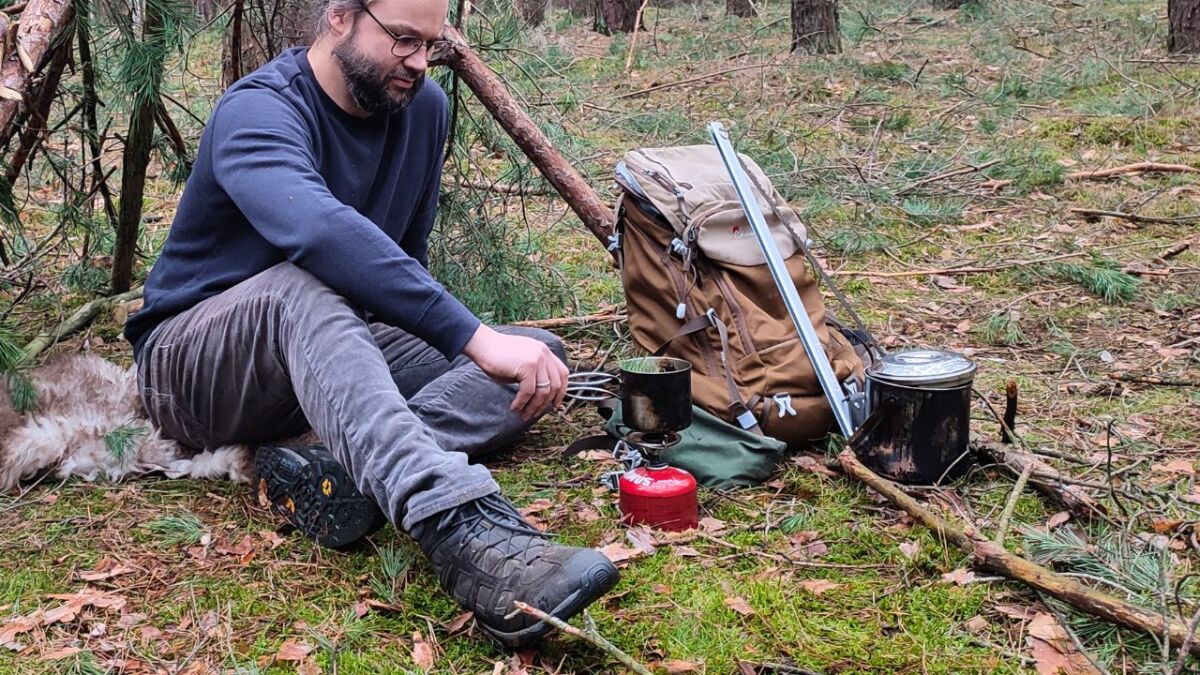
What do you earn as a self-employed survival trainer?
If you become self-employed as a survival trainer, you can offer courses and programs as you wish. If you have the reach, expect to give 20 to 30 courses per year.
With courses, usually weekends or day courses are meant. Ideally, you offer weekends because the preparation for day courses is almost the same effort.
For the seminar, you can take care of up to ten people alone. If there are more people, you will need a teamer. I recommend that you have a second person as support with you from twelve people onwards (you will, of course, have to pay for them).
Here are some exemplary prices that you can charge as a survival trainer.
- For a one-day program, you can charge €90 to €140 per person
- For a two-day program, you can charge €200 to €240 per person
- For a three-day program, you can charge €300 to €340 per person
- For a six-day program, you can charge €500 to €600 per person
- For a ten-day program, you can charge €900 to €1000 per person
So, you see that you can earn €2000 to €2400 gross for a two-day program on the weekend with ten participants. But is that pure profit? Let's take a closer look at this income.
ℹ️ Notes
- Gross income: This is the total amount you charge for your services or products, including the 19% value-added tax.
- Net income: This is the amount you receive after deducting the 19% value-added tax. It is the amount you actually receive for your work or products.
- You then pay income tax on the net income.
The difference: Your gross income is higher than your net income. The difference between the two is the 19% value-added tax that you pay to the tax office.
What annual income can you expect as a self-employed survival trainer?
Let's calculate that.
Example 1: You work only for yourself
You offer courses and seminars yourself. Your courses are always full. As a survival trainer who works alone, you can take care of a maximum of ten people. You offer the following courses per year:
- 10x day course at €100 per person and 10 people per course
- 5x two-day program at €200 per person and 10 people per course
- 5x three-day program at €300 per person and 10 people per course
This results in a total income of €35,000 gross per year.
| Item | Amount in € |
|---|---|
| Total income (gross per year) | 35,000 |
| VAT (19%) | 5,588 |
| Health and nursing care insurance | 6,500 |
| Income tax (unmarried) | 4,528 |
| Net income (after deduction of taxes and insurance) | 29,412 |
| Remaining amount (for living and operating expenses) | 18,384 |
| Salary per month | 1,532 |
If you are married, the following calculation applies:
| Item | Amount in € |
|---|---|
| Total income (gross per year) | 35,000 |
| VAT (19%) | 5,588 |
| Health and nursing care insurance | 6,500 |
| Income tax (married) | 2,660 |
| Net income (after deduction of taxes and insurance) | 20,252 |
| Salary per month | 1,687 |
✅ The advantages of this option are the higher earnings because you are essentially working only for yourself. You can set your prices as you like, cancel courses or add new ones.
❌ The disadvantage is that you have to take care of ensuring that your courses are always full. If participants stay away, the money stays away.
Note: From the salary per month, fixed costs for conducting the courses are deducted, such as terrain rental, catering, consumables, depreciation, etc. Please note that these can still be significant costs.
Example 2: You work for a survival school
You do NOT offer courses and seminars yourself, but work for wilderness schools. Your courses are always filled with ten people. You can conduct the same courses every year, but you have to expect that the wilderness school also wants to make a profit - after all, they take care of the participants.
So, you will be paid in the form of an hourly rate. You will receive a fixed rate per hour worked, which is usually between €20 and €40.
Let's assume you earn €30 per hour as a beginner and that you give the same courses as mentioned before. Please note that you will not be paid for a full 24 hours for multi-day events. You will then receive a daily rate, which is between €250 and €350.
- 10 day courses at €40 per 8-hour day = €2,400
- 5 two-day programs at €350 per day rate = €3,500
- 5 three-day programs at €350 per day rate = €5,250
- Various other courses (you still have to calculate these here, otherwise your salary will be very low): €3,000
This will give you a total income of €14,150 gross per year.
| Item | Amount in € |
|---|---|
| Total income (gross per year) | 14,150 |
| Sales tax (small business) | 0 |
| Health and nursing care insurance | 2,580 |
| Income tax | 556 |
| Net income (after deduction of taxes and insurance) | 11,014 |
| Salary per month | 918 |
If you are married, the following calculation applies:
| Item | Amount in € |
|---|---|
| Total income (gross per year) | 14,150 |
| Sales tax (small business) | 0 |
| Health and nursing care insurance | 2,580 |
| Income tax (married) | 0 |
| Net income (after deduction of taxes and insurance) | 11,570 |
| Salary per month | 964 |
✅ The advantages are clear: you don't have to worry about participants, and this type of work is perfect for starting out as a survival trainer. Furthermore, you will receive a ready-made program and usually an introduction from your wilderness school. You don't have any major fixed costs, such as rent, equipment, and food for participants.
❌ The disadvantages are the lower income, the fact that you are not free to design your own courses, and that you are bound to your partner school.
Example 3: You are a franchisee
As a franchisee in a survival school, you enter into a licensing agreement with the survival school that allows you to operate under their brand name.
This means that you can use their proven business models, training materials, marketing strategies, and other resources to run your survival training business.
In return for these benefits, you usually pay an initial franchise fee as well as ongoing fees or percentages of your revenue to the survival school. These fees may vary depending on the franchise agreement. I found a wilderness school and inquired, and the percentage was 15%.
✅ Advantages: As a franchisee, you benefit from the brand's recognition and good reputation, which can help you attract customers. You also receive support and training from the survival school, which can be especially helpful if you are new to the business.
❌ Disadvantages: However, it is important to note that as a franchisee, you also have certain obligations. You must adhere to the standards and procedures of the survival school, and you are typically responsible for your own operating expenses and business risks.
Therefore, you must carefully review and understand the franchise agreement before committing to it.
Note: You still have to pay 19% sales tax on your monthly earnings.
What do you earn as an employed survival trainer?
The salary varies depending on the wilderness school, but you can expect to earn between €20,000 and €40,000 per year for a 40-hour week.
It's different here because you're employed at a survival school.
✅ Your health insurance is partially covered by the employer, and you have a fixed number of hours that you must work. You don't have to worry about customers, someone else takes care of that. If a course is cancelled, you still get paid. If you're sick, you still get paid. The advantages here are more security.
❌ The disadvantage is that you have a supervisor who assigns you tasks and courses. Overtime can also occur, especially when other survival trainers or teamers are on sick leave.
The main differences between an employed and a freelance survival trainer
Here is a table that shows the most important differences between an employed and a freelance survival trainer:
| Employee Survival Trainer | Freelance Survival Trainer | |
|---|---|---|
| Employment status | Employed by an organization or company. | Self-employed, working on a contract basis for various clients. |
| Income | Regular salary, often with social benefits such as health insurance, pension contributions, etc. | Income varies depending on the number and types of assignments. No social benefits unless they are self-organized. |
| Working hours | Often fixed working hours set by the organization. | Flexible working hours based on the needs of the clients. |
| Workplace | Often at a fixed location or in a specific area determined by the organization. | You can work in different locations depending on where the clients are. |
| Responsibilities | Responsibilities and tasks are determined by the organization. | Can decide for themselves which assignments to accept and which services to offer. |
| Risks | Less risk as income and working conditions are stable. | Higher risk as income and working conditions can vary. |
| Freedom | Less freedom in terms of choosing work and designing working conditions. | More freedom in terms of choosing work and designing working conditions. |
Please note that these are general differences and the exact conditions may depend on the specific situation and contractual terms.
What does a typical work day look like for you?
If a course is coming up, the day is mainly spent preparing and packing. During the actual course, such as a survival camp, I then accompany the group throughout the entire duration and guide them through our program. It is very diverse, there is constantly something new happening and sometimes it is also quite physically challenging. But I do not want to underestimate that there is also a lot of office work involved 😊
– Benjamin Arlet - Since 2015 Survival Trainer & Founder of SurviCamp
Do I need to insure myself as a survival trainer in Germany?
As a survival trainer, whether employed or self-employed, there are various insurances that you should consider:
Health Insurance
- Employee Survival Trainer: In most countries, including Germany, employers are required to insure their employees against illness. This means that as an employed trainer, you are usually insured against illness through your employer.
- Freelance Survival Trainer: As a freelance trainer, you are responsible for your health insurance/long-term care insurance. You can either voluntarily insure yourself in the statutory health insurance or take out private health insurance. The costs vary depending on the insurance provider and your health condition.
Professional and Business Liability Insurance for Survival Trainers
Regardless of whether you are employed or self-employed, you should consider professional and business liability insurance.
This insurance covers personal or property damage that could occur during your professional activities. Your private liability insurance usually does not apply in these cases.
As a trainer, you are obligated to financially compensate for such damages. However, with professional and business liability insurance, you can secure this risk. The costs for this insurance vary depending on the provider and the type and extent of coverage you choose.
You must thoroughly inform yourself about the various insurance options and choose an insurance that corresponds to your specific needs and risks as a survival trainer.
For example, I am insured with the insurance company andsafe. Other wilderness trainers that I know use trainer-haftpflicht-versicherung.de. The cost differences are marginal.
Here is a calculation example from andsafe (calculate it yourself here):
- Annual revenue: €35,000
- Newly founded
- Insurance coverage amount: €10,000,000.00
- Payment method: annually
- No deductible
- Annual cost approximately €100.40
Conclusion: I recommend paying the €100 per year. You will sleep better and the investment is low.
Let's now take a look at 5 schools that offer survival trainer training.
4 Wilderness and Survival Schools that offer Survival Trainer Training
There are various wilderness schools and survival schools that offer training as a survival instructor. I would now like to introduce you to five of them, with their content, costs, and other details.
1. Survicamp: Outdoor Guide & Survival Guide
SurviCamp offers a trainer education with a focus on outdoor guide and survival guide.
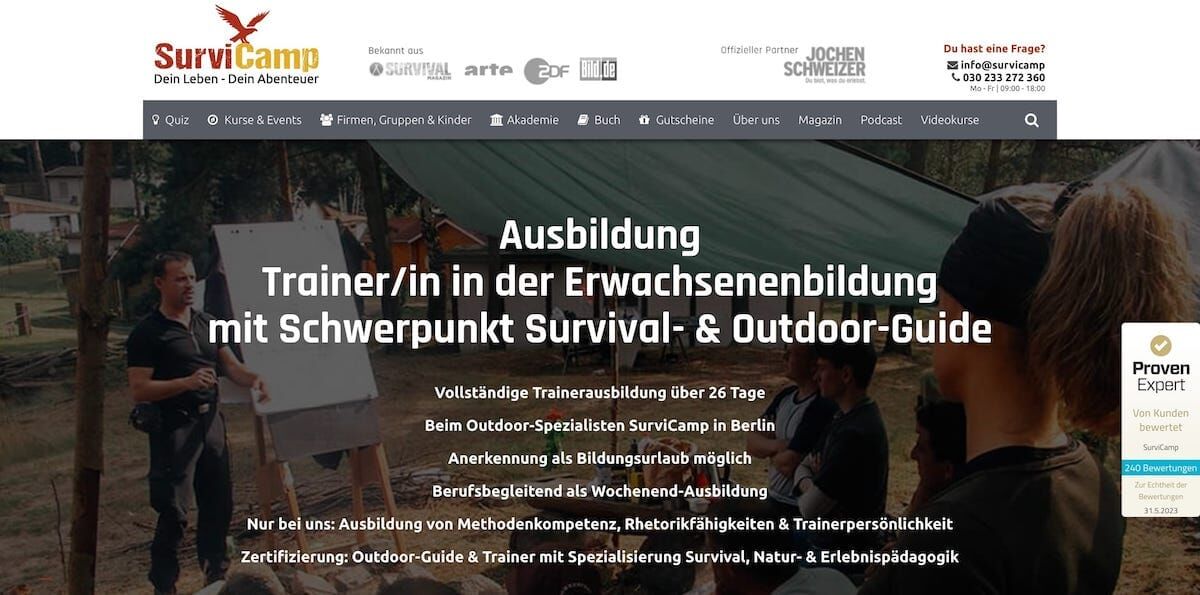
Contents of the Trainer Education
The education includes a variety of modules, including survival guide, ropes, climbing, knots, heights, outdoor medic, crisis prevention & equipment knowledge, food from nature, creating & designing trainings, communication, leading groups, addressing & inspiring groups, understanding & controlling group dynamics, self-employment & marketing, final presentations and final examination.
The education is strongly practice-oriented and also includes extensive communication training. It covers all relevant areas, including professional competence, methodological competence, personal competence and nature & adventure education.
Process & Scope
The education lasts a total of 26 days and includes 182 hours of training. It takes place on weekends and is divided into 8 modules, each of which takes place from Friday to Sunday, except for the first module, which lasts from Wednesday to Sunday.
Costs
The participation fee is a total of €2,699 for all modules including examination, plus €289 for terrain use and partial catering.
There is an early bird discount of €100 for registration up to 3 months before the first module. The fee can be paid in full or in installments.
Certificate
After successfully completing the education and passing the examination, you will receive a certificate as a "Trainer in Adult Education with a Focus on Survival & Outdoor Guide".
👉 For all details on the contents of the modules, please visit the trainer overview page on survicamp.de (German Website).
What is the most extraordinary thing you've ever experienced during a survival training?
During our survival camps, we often cross a lake or river. Once, on our way to the water, I heard a rumbling in the middle of the forest. It got louder and louder, and I wondered what it could be because there were no roads in that direction and the noise wasn't moving. Suddenly, I came across a running generator. The cable led to a - probably illegal - beach party on the lake we were about to cross. And so we had a pretty techno soundtrack while we packed our backpacks and swam across. It was pretty surreal.
- Benjamin Arlet - Since 2015 Survival Trainer & Founder of SurviCamp
2. Naturabenteuer Niederrhein: Survival Trainer
The Nature Adventure Lower Rhine is an intensive and practical training that focuses on a variety of wilderness skills, survival skills, and nature crafts. Here are specific information about the training:
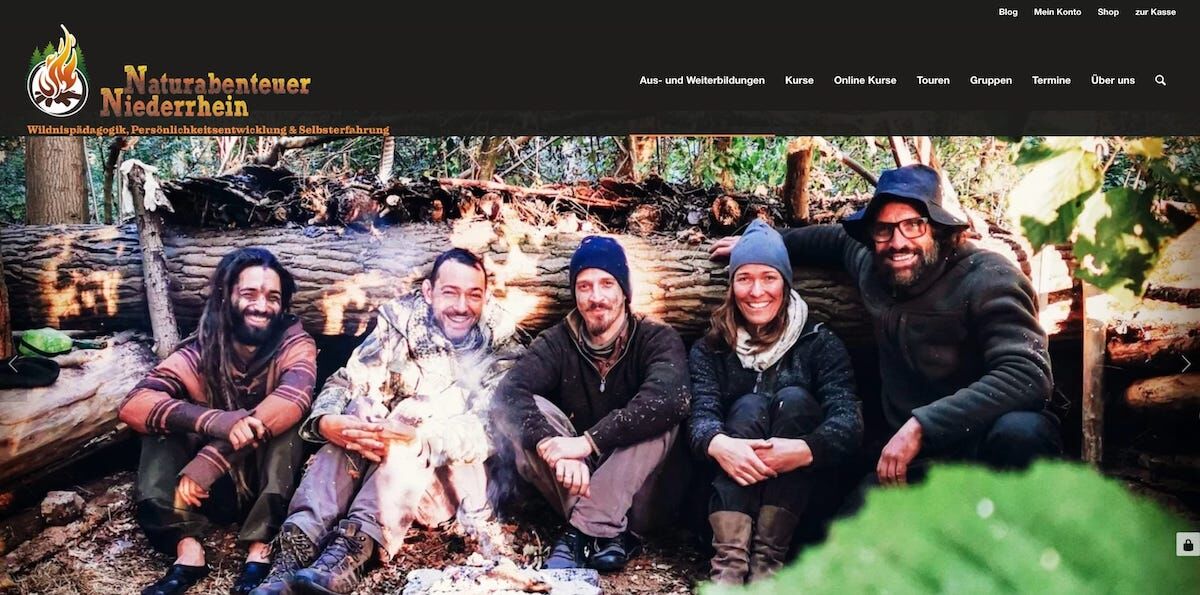
Contents of the Trainer Training
The training prepares participants to live for 14 days in the Swedish wilderness of Lapland under simple conditions and to apply what they have learned. The training aims to enable participants to plan own concepts methodically and didactically and to work with own groups in nature. In addition to the skills, the focus is also on living in community and developing social qualities.
Course & Scope
The training lasts for 12 months and includes 7 consecutive blocks (a total of 40 days, at least 300 hours) in all seasons. Between the blocks, the participant receives practical home studies to deepen what they have learned, for which about 2 hours per week can be scheduled.
Costs
The training costs €3,600, including accommodation and meals on the school grounds, but excluding the costs for travel to and from Sweden. Payment can be made either as a direct bank transfer of the total amount or in a maximum of 12 installments of €300 by standing order/direct debit.
Certificate
After completing the training, the participant receives a certificate issued by the Wilderness School Nature Adventure Lower Rhine. The certificate provides information about the learning topics and contents of the training.
👉 On the website of Naturabenteuer Niederrhein (German Website), you will find all information about the contents of the modules.
3. EarthTrail: Survival Instructor / Trainer
Contents of the Trainer Training
The training focuses on imparting knowledge, skills, and content in the field of survival in a professionally sound and professional manner. It enables participants to lead groups in nature, even under extreme conditions.
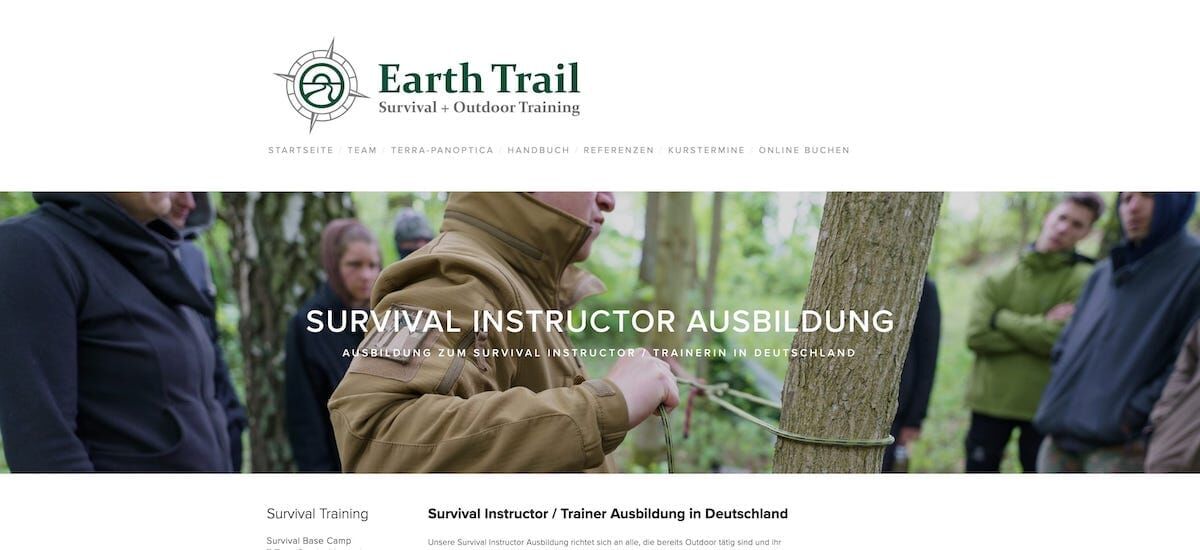
In addition to practical survival tools and a well-founded outdoor advanced first aid training, the topics of safety, organization, and administration as well as methodology and didactics in the outdoor context are the focus of the training. There are also optional additional modules.
It is important to note that this training differs from the EarthTrail Outdoor Guide training, as it places higher demands on the core competencies of the instructor in the field of survival and survival training. It enables you to independently conduct courses, seminars, and trainings.
Procedure & Scope
The training lasts one year and is divided into various modules and teaching trainings that you go through. The training is intensive and demanding and prepares participants comprehensively for the activity as a survival instructor.
Costs
The training fee is €5,500. There is an early bird discount of €500, which reduces the fee to €5,000. For EarthTrail Outdoor Guides, the fee is €4,500.
The fee includes all costs for training, teaching materials and the rental of special equipment. Not included are costs for arrival and departure, meals, personal equipment and overnight stays outside the survival camp.
Certificate
After completing the training and passing the exam, you will receive a certificate of completion. You will also receive proof of first aid training and have the opportunity to join the EarthTrail partner network.
👉 Click here and get all the details about the EarthTrail training (German Website)
4. Live the Wilderness: Survival Scout Training
Contents of the Trainer Training
The training teaches the most important skills for independent survival in the wilderness.
These include orientation with a map and compass, improved Survival Techniques such as bow drilling, and overcoming natural obstacles such as rivers and rock walls.
A special focus is on developing your own style as a trainer and improving presentation techniques.
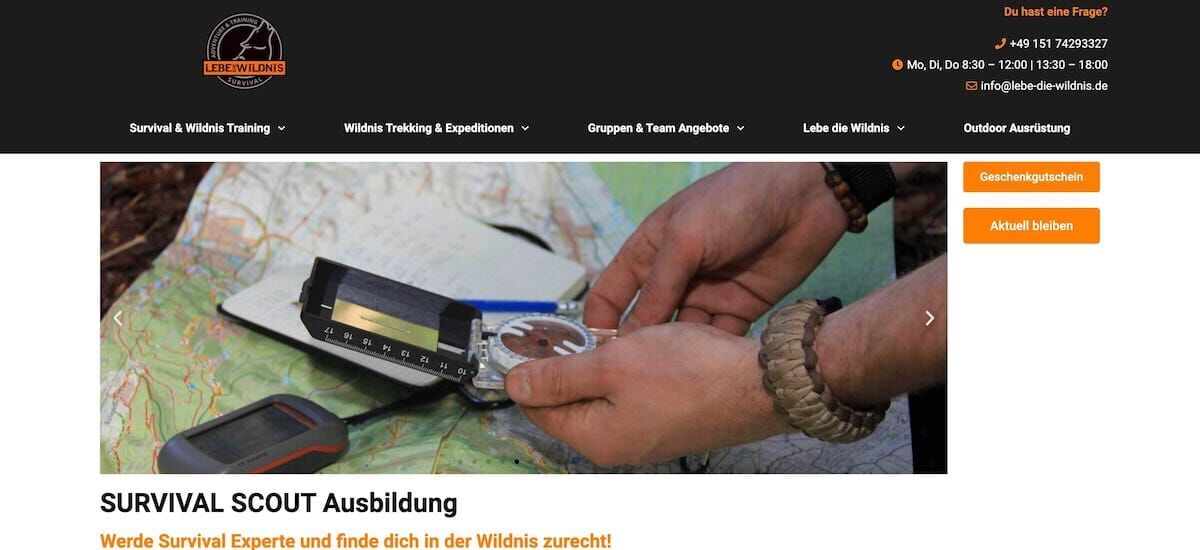
Process & Scope
The Survival Scout training consists of four individual courses: Outdoor Survival Basic, Survival Base Camp Advanced, 4 Days Survival Pro, and Realistic Survival.
All courses build on each other and should be completed in sequence. Between the individual modules, you will receive theory and practical tasks to deepen your learning. The courses take place at different locations and times to provide participants with different conditions and resources.
Costs
The total cost of the training is €1,199.
Certificate
After passing the exam, you will receive a certificate as a Survival Scout. The evaluation takes place in the first three courses and is offset against the final exam in Realistic Survival.
With outstanding performance, there is also the possibility of working as an assistant trainer at the events and courses of Live the Wilderness in the future.
👉 You can find all the information about the Survival Scout training on the website of Live the Wilderness (German Website).
Summing it up in 5 steps: How can I become a survival trainer?
If you meet the requirements to work as a survival trainer, there are some steps you must take to make your dream come true.
Here are the basic steps you need to take:
Step 1: Take survival training courses and obtain certifications
The first step to becoming a survival trainer is to complete a qualified training program. There are many schools and organizations that offer survival training courses that can prepare you for work as a trainer.
Search for a course, seminar, or training that teaches you practical skills and the knowledge you need to become a successful survival trainer.
Aside from education, it is also important to obtain certifications in first aid and other relevant areas. These certifications demonstrate to potential employers that you have the necessary knowledge and skills to assist in an emergency.

Step 2: Expand your survival training skills
Once you have completed the basic survival training courses, you should continue to develop your skills to become an expert in this field.
This may mean that you are participating in advanced courses or training programs to strengthen your skills in areas such as winter survival, fire, food search, and hunting.
Step 3: Find a job as a survival trainer
After completing your education and strengthening your skills, it's time to find a job as a survival trainer.
This could mean that you apply to outdoor companies and survival schools, or offer your survival training courses.
If you offer your courses, then be sure to ask yourself how to attract participants. Do you have a website? Have you registered on portals with your courses? Can you maybe reach potential participants through Instagram or YouTube?
I recommend that you work as a freelance or employed trainer for wilderness schools for the moment.
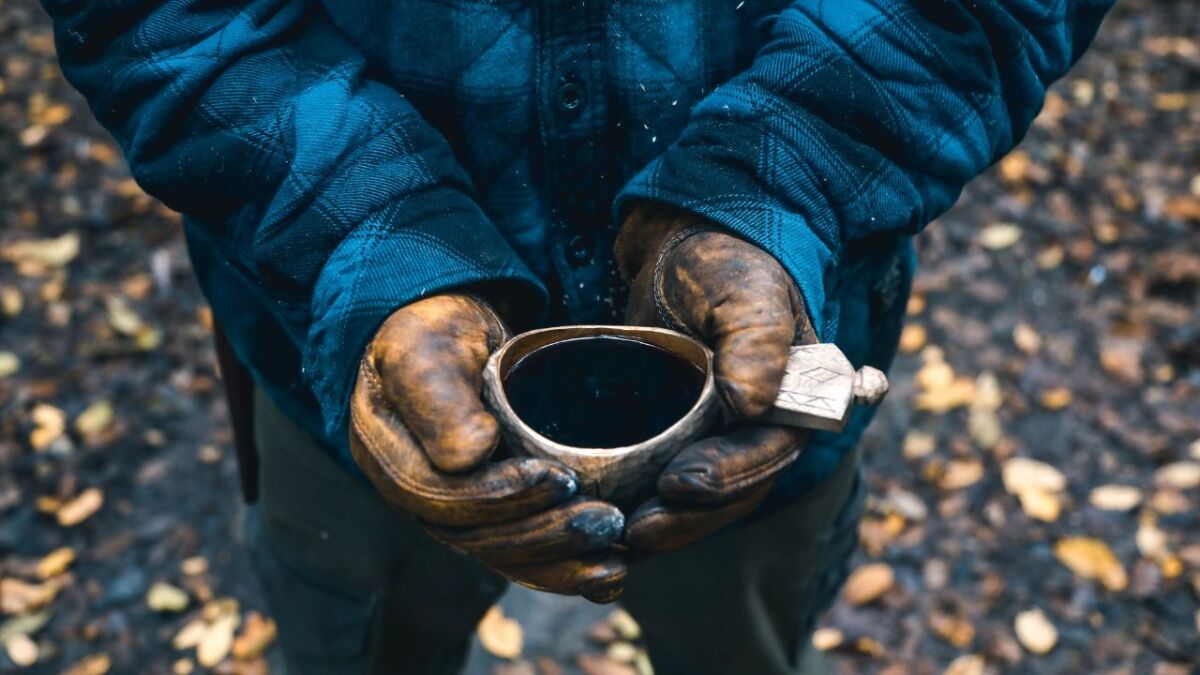
Step 4: Start your survival training company in Germany
If you have already gained experience as a survival trainer and achieved a certain level of success, you may consider starting your survival school company.
This gives you the freedom to design your own offer and set your prices.
What is your outlook on the future of survival training?
Survival will likely continue to grow in popularity and reach a wider audience.
– Benjamin Arlet - Since 2015 Survival Trainer & Founder of SurviCamp
Step 5: Market your survival training services
Whether you work for a company or start your own business, you need to market your survival services to attract customers.
Use social media to promote your offer and share photos and videos of your courses to excite potential customers. A website presence will also assist you in this.
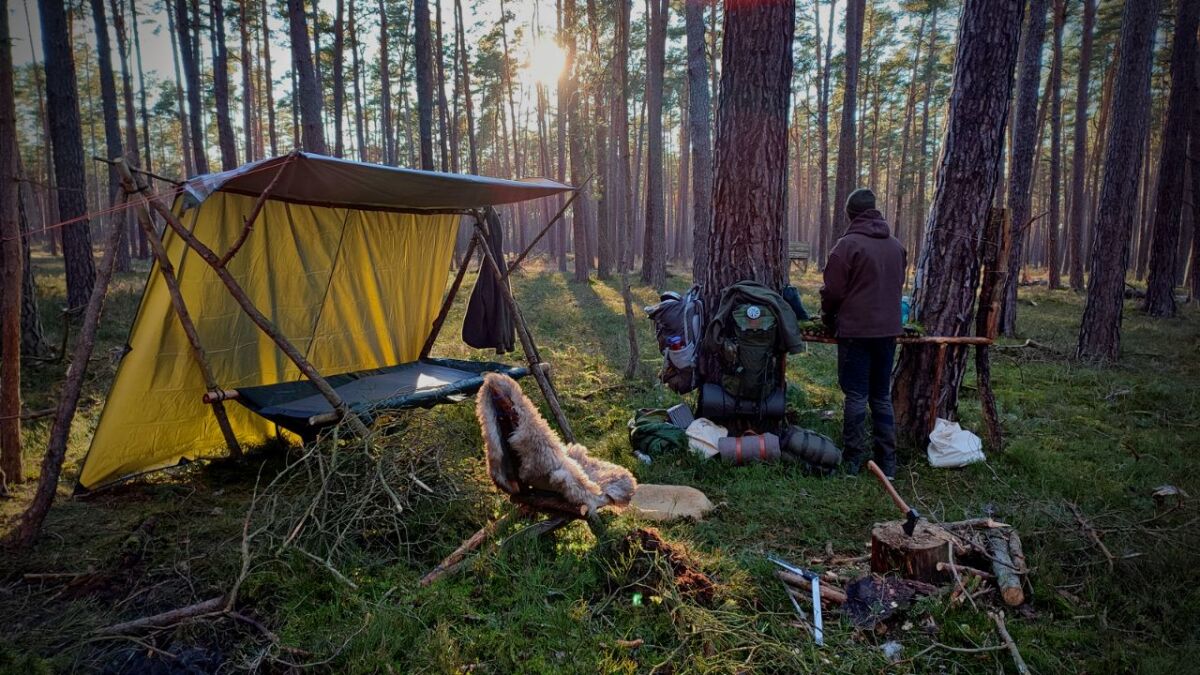
Can I, as a survival trainer in Germany, simply go into the forest with my groups?
You can go into the woods with your groups as a survival trainer, but you should consider some things. Because it's not as easy as it sounds at first.
Here are my tips and advice on legal matters:
- It is important to comply with the laws and regulations in Germany.
- You usually need a permit to camp or stay overnight in certain forests.
- Note: There are state-owned and private forests. Contact the forestry office or the forest owner for a permit.
- In some areas - such as nature reserves - it is not allowed to leave the paths. You cannot conduct survival training there.
- A fire in the forest is also only possible with permits or special precautions.
- If you are traveling with groups, register your course with the forester.
What advice would you give to someone who is considering becoming a survival trainer?
Have the courage to take the first uncertain step in that direction. It may take some time, but it's about your calling - I ultimately didn't regret it.
– Benjamin Arlet - Since 2015 Survival Trainer & Founder of SurviCamp
Please refer to the following guides to help you understand the legal situation in detail:
- Is Bushcrafting legal? Making fire? Building a camp? Hunting, fishing? What you are allowed to do and what not, you can find out here.
- Collecting branches and sticks in the forest - is it allowed? This article will clarify whether it is forbidden to collect wood.
- Sleeping in the forest: After a long hike in the forest, setting up your tent and spending the night under the stars sounds wonderful. But is sleeping in the forest allowed? and how is that with the fears on the first night?
- Do you want to build traps and hunt animals? Hunting vertebrates is strictly prohibited in Germany by law. In this article, I will clarify.
- Where in Germany can you practice Bushcraft and Survival? Can you go to the forest? Is your backyard suitable? What other places are there? Here I will clarify how you can legally get to your place.
But hey, don't get discouraged - with a little planning and preparation, you can have an outstanding time and provide your groups with an unforgettable experience.
Remember that survival in the wilderness can be a challenge, but it can also be a great way to connect with nature and your abilities.
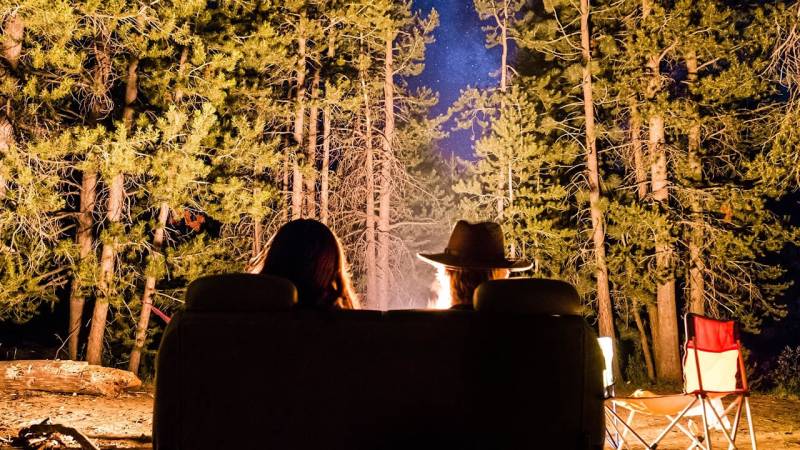
Conclusion and Final Thoughts
A career as a survival trainer can be a rewarding and fulfilling experience that allows you to share your passion for nature with others.
If you are willing to invest time and energy into your education and building your reputation as a trustworthy and competent expert in this field, then this could be the right career path for you.
Follow the steps described in this article to start and grow your career as a survival trainer in Germany.
I wish you all the best of luck, a good time, and if you need any clarification, please let me know.

Sources for the guide
https://www.sueddeutsche.de/karriere/berufe-serie-vii-was-macht-ein-survival-trainer-1.1492610
https://www.tk.de/service/app/2004108/beitragsrechner/selbststaendigeRechner.app
https://www.bmf-steuerrechner.de/ekst/eingabeformekst.xhtml

Author of the guide
Martin Gebhardt
Hey, I'm Martin. On my blog, you will learn the basics and numerous details about living in the wild. I think survival, bushcraft and the good life in nature are the keys to happiness. Find me here on Instagram or on YouTube. You can find more about my mission on the About Me page.
Was this guide helpful?
24 people found this guide helpful.
5.00 out of 5 points (24 Ratings)
Comments (0)
This post may contain affiliate links. So if you click on the links and make a purchase, I will receive a small commission at no additional cost to you. Click here, to learn more about it.



